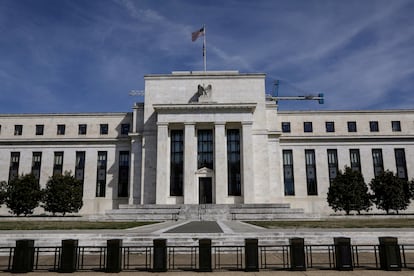Will mortgage rates go down in September? Here’s what you need to know
Rising unemployment and inflation are key factors suggesting a decline in mortgage rates in the United States

Federal Reserve Chief Jerome Powell has signaled that the central bank will cut rates in September, which is expected to have an impact on mortgage rates. However, it is not yet clear how far rates will fall and how long that decline will last.
The U.S. housing market is going through a difficult period due to high mortgage rates, which have risen far higher than just three years ago. The average rate on a 30-year mortgage currently hovers around 7%, significantly higher than the sub-3% rates available in 2020 and 2021. These rates have kept many potential buyers on the sidelines, prolonging the housing market downturn for the third consecutive year.
However, there is some optimism that mortgage rates could come down soon, due to several economic factors and the upcoming key dates of September 2024.
Current rates
According to data available through September 3, the average interest rate for a 30-year mortgage in the United States is 6.368%. Other mortgage rates, such as those for jumbo loans, FHA loans, VA loans and USDA loans, also vary slightly, but generally remain above 6%. These rates represent a significant increase from just a few years ago, when they were at historic lows, creating a much more difficult environment for homebuyers, especially by contrast.
Mortgage rates are defined by a variety of factors, including Federal Reserve decisions, inflation levels and general economic conditions. The Federal Reserve has raised interest rates to combat inflation, which has led to higher borrowing costs throughout the economy, including mortgages. However, there are indications that the Fed may back off this month, which in turn would lower mortgage rates.

Key dates in September
Some September dates will help tell if mortgage rates will decline. They are tied to the release of important economic data and Federal Reserve meetings, which directly influence interest rates.
On September 6, the Bureau of Labor Statistics will release its unemployment report for the month of August. Recent trends show an increase in unemployment, and if the report confirms this, it would be a sign that the economy is slowing. When the unemployment rate rises, that usually puts pressure on the Federal Reserve to reduce interest rates and stimulate economic activity. If the unemployment report is a cause for concern, it could lead to speculation of a larger rate cut, which in turn would cause mortgage rates to decline.
September 11 is another important date, as that is when the most recent inflation data will be released. Inflation has been on a downward trend for several months, and if the August data show that this holds, it will increase the likelihood that the Fed will make a rate cut.
September 18 is the most important date, as this is when the Federal Reserve will conclude its meeting and could announce its first rate cut since March 2020. Although it is not known how large the rate adjustment will be, the market anticipates a reduction of 0.25 to 0.5.
What happens if rates are reduced?
A reduction in mortgage rates would make homeownership more affordable, which could increase home buying activity and stabilize or even boost prices. In addition, homeowners with higher mortgage rates could take advantage of the opportunity to refinance by lowering their monthly payments and freeing up income for other expenses, which could positively influence consumer spending and the overall economy.
However, while lower rates could help revive the housing market and boost economic confidence, there are potential risks. A rapid decline could cause the housing market to “overheat,” with prices rising rapidly. In addition, if the Fed cuts rates due to a severe economic downturn, it could signal deeper economic problems that may not be easily solved with lower interest rates alone.
Tu suscripción se está usando en otro dispositivo
¿Quieres añadir otro usuario a tu suscripción?
Si continúas leyendo en este dispositivo, no se podrá leer en el otro.
FlechaTu suscripción se está usando en otro dispositivo y solo puedes acceder a EL PAÍS desde un dispositivo a la vez.
Si quieres compartir tu cuenta, cambia tu suscripción a la modalidad Premium, así podrás añadir otro usuario. Cada uno accederá con su propia cuenta de email, lo que os permitirá personalizar vuestra experiencia en EL PAÍS.
¿Tienes una suscripción de empresa? Accede aquí para contratar más cuentas.
En el caso de no saber quién está usando tu cuenta, te recomendamos cambiar tu contraseña aquí.
Si decides continuar compartiendo tu cuenta, este mensaje se mostrará en tu dispositivo y en el de la otra persona que está usando tu cuenta de forma indefinida, afectando a tu experiencia de lectura. Puedes consultar aquí los términos y condiciones de la suscripción digital.









































